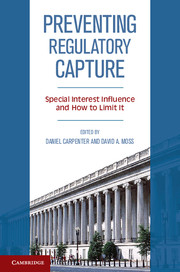Book contents
- Frontmatter
- Contents
- List of Figures
- List of Tables
- Editors
- Contributors
- Preface
- Acknowledgments
- Introduction
- Section I Failures of Capture Scholarship
- Section II New Conceptions of Capture – Mechanisms and Outcomes
- Section III Regulatory Case Studies
- Section IV The Possibility of Preventing Capture
- 13 Preventing Capture Through Consumer Empowerment Programs
- 14 Courts and Regulatory Capture
- 15 Can Executive Review Help Prevent Capture?
- Conclusion
- Afterword
- Index
- References
13 - Preventing Capture Through Consumer Empowerment Programs
Some Evidence From Insurance Regulation
Published online by Cambridge University Press: 05 June 2014
- Frontmatter
- Contents
- List of Figures
- List of Tables
- Editors
- Contributors
- Preface
- Acknowledgments
- Introduction
- Section I Failures of Capture Scholarship
- Section II New Conceptions of Capture – Mechanisms and Outcomes
- Section III Regulatory Case Studies
- Section IV The Possibility of Preventing Capture
- 13 Preventing Capture Through Consumer Empowerment Programs
- 14 Courts and Regulatory Capture
- 15 Can Executive Review Help Prevent Capture?
- Conclusion
- Afterword
- Index
- References
Summary
INTRODUCTION
In many regulatory settings, consumers and citizens face a collective action problem in advocating for their preferred outcomes, whereas regulated entities can coordinate to overcome free rider problems. The resulting imbalance in participation can, in some cases, produce outcomes that are “consistently or repeatedly directed away from the public interest toward the interest of the regulated industry by the intent and action of the industry itself.” In the classic story, such regulatory capture occurs through industry payment of rents to regulators, including explicit bribes, promises of future employment, or political contributions. However, more recent literature emphasizes that one-sided participation in regulation can also produce capture through cultural and behavioral forces. Similarly, industry-dominated participation in regulatory processes may generate “information capture,” by which industry exerts substantial control over regulatory outcomes by producing “uncontrolled and excessive” amounts of information.
In recent years, academic interest in limiting these forms of regulatory capture has skyrocketed. One approach to preventing capture that has gained some traction in recent decades is the creation of consumer empowerment programs that directly enhance the capacity of consumer representatives to participate in regulatory processes. These programs come in two basic varieties. First, proxy advocacy relies on independent government entities that are tasked with representing the public interest in designated regulatory proceedings. These programs became particularly prominent in state regulation of utility rates during the 1970s and 1980s. Second, tripartite consumer empowerment programs seek to amplify the voice of nongovernment public interest groups that would ordinarily be under-represented in the regulatory fray. Examples include statutorily required consumer advisory panels for regulators and programs that reimburse consumer groups for the cost of participating in regulatory proceedings.
- Type
- Chapter
- Information
- Preventing Regulatory CaptureSpecial Interest Influence and How to Limit it, pp. 365 - 396Publisher: Cambridge University PressPrint publication year: 2013
References
- 11
- Cited by



